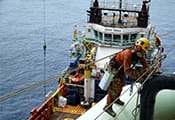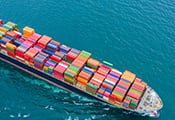Objective behind Incoterms in Marine Insurance
There are several rules and regulations enshrined in the Incoterms by the government and legal experts. Incoterms in marine insurance are the trade rules which remove every ambiguity with regard to international trade. It has put further light on the attributes of the marine policy.
Incoterms in Marine Insurance
Let us discuss these terms in detail.
Mode of Transport
The following rules apply to every mode of transport.
EXW (Ex Works)
In the context of a sales agreement, when the stipulation is EXW (Ex Works), it signifies that the seller's obligation involves making the goods accessible at a designated location. This location could encompass the seller's factory, industrial facility, or any mutually agreed upon venue. Within this arrangement, the predominant weight of responsibility rests upon the buyer, with the seller's role being relatively diminished.
The seller assumes the duty of loading the goods onto transport, an action funded and assumed at the buyer's risk. Of paramount importance, however, is the explicit articulation of these terms within the contract.
Within the framework of EXW terms, the buyer also shoulders the responsibility of securing customs clearance and meticulously fulfilling all export-related documentation requisites.
FCA (Free Carrier)
The FCA terms specify that the seller must deliver goods for export at an agreed destination, usually their own premises. The responsibility for loading and unloading goods depends on the delivery location, a crucial aspect of marine insurance. If delivery occurs at the seller's premises or a controlled location, they load the buyer's carrier. But if delivery is elsewhere and the seller loads, the buyer handles loading onto their own carrier.
CPT (Carriage Paid To)
"Carriage Paid To" means the seller delivers and covers the cost of transporting goods to an agreed destination. The seller also pays for the carriage expenses. Goods delivery is confirmed only when the buyer receives them at the specified shipment address.
CIP (Carriage and Insurance Paid to)
CIP is much like CPT. The seller must deliver and cover the carriage expenses. Additionally, the seller needs to get insurance for the goods during transit. The insurance for CIP should be 110% of the contract value with minimum coverage.
DAT (Delivered at Terminal)
The seller must bring the goods to the agreed terminal, port, or destination in line with the DAT agreement. They cover transport expenses and handle risks until the goods reach the destination or port.
DAP (Delivered at Place)
The seller hands over the goods to the buyer on the arriving transport, ready for unloading at the named destination. Now, the risk is on the buyer, not the seller.
DDP (Delivered Duty Paid)
In a DDP agreement, the seller is in charge of delivering goods to the buyer's chosen destination within the buyer's country. The seller covers transport, customs, duties, and taxes. Unloading isn't their responsibility. Once the buyer gets the goods at the destination, the risk and responsibility shift to them.
The following rules apply to the sea transport.
FAS (Free Alongside Ship)
In simple words, the seller delivers the goods next to the buyer's ship at the designated port stated in the contract. Under this agreement, the buyer takes on the expenses and potential losses or damages for the goods from the moment of delivery by the seller.
FOB (Free on Board)
In this arrangement, the seller covers the expenses and risks until the goods are loaded onto the ship. The seller is responsible for handling all export clearances.
CFR (Cost and freight)
According to the Cost and Freight rule, the seller pays for shipping the goods to the named destination port. Then, they load the goods onto the departing ship. After this, the buyer takes on the risks.
CIF (Cost, Insurance & Freight)
CIF is much like CFR, but the difference is that the seller must also insure the goods during transit to the designated port. This insurance, required in CIF, covers the goods for at least 110% of their value under specific clauses.
Comprehending Incoterms in marine insurance is crucial when seeking coverage. These terms clarify roles and risks, leading to smoother transactions and better coverage for both buyers and sellers.
Conclusion
Incomterms are the essential rules and regulations framed by legal experts. The sellers and buyers who deal in the international market must understand the Incomterms of the marine insurance policy.




































 Expert advice made easy
Expert advice made easy


